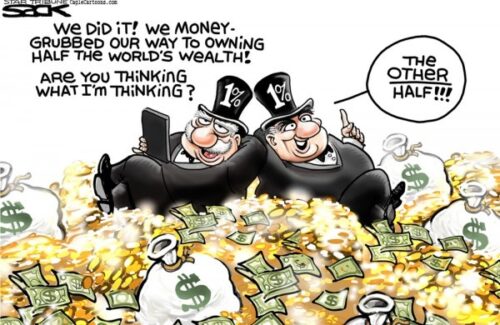
After he lost the 1912 presidential election on the Progressive Party ticket, Roosevelt wrote his lengthy Autobiography. His insights on “the malefactors of great wealth”–and the urgent need to regulate and/or dismantle them–remain as perspicacious as ever.
Regarding a sycophantic judge who had written to a prominent finance-capitalist that he was “willing to go to the very verge of judicial discretion to serve your vast interests,” Roosevelt commented on the judge’s “wholly inexplicable reverence for the possession of a great fortune as such. He sincerely believed that business was the end of existence… and the bigger the business, the more he desired to favor it” (p. 50). Roosevelt noted as well “the largely unconscious way in which the courts had been twisted into the exaltation of property rights over human rights” (p. 251).
During his first term as president, recognizing the inadequacy of the Sherman Antitrust Act (1890), Roosevelt successfully pursued the dissolution of the Northern Securities railroad oligopoly (J.P. Morgan and others), as well as the American Tobacco and Standard Oil monopolies. (As to the latter, under Republicrat Clinton in the Nineties, oil giants were allowed to merge, once again–as ExxonMobil, ChevronTexaco, etc.).
Commenting on the folly of the single-minded pursuit of great fortunes, on the actual uselessness of massive personal wealth far beyond one’s needs–and on the public’s absurd reverence for the super-wealthy–Roosevelt commented that he was “simply unable to make myself take the attitude of respect toward the very wealthy men which such a multitude of people evidently really feel…. I wholly fail to see where any real enjoyment comes from a dozen automobiles…and a good many different homes luxuriously upholstered” (p. 243-244).
Finally, anticipating the danger of a “Citizens United” type of corporate take-over of electoral democracy, Roosevelt noted that “those artificial individuals called corporations become so very big that the ordinary individual is utterly dwarfed beside them, and cannot deal with them on terms of equality…. It is necessary that laws be passed to prohibit the use of corporate funds directly or indirectly for political purposes” (p. 257, 329).
All quotations from: The Autobiography of Theodore Roosevelt, edited by Wayne Andrews, Scribner’s (New York), 1958.










